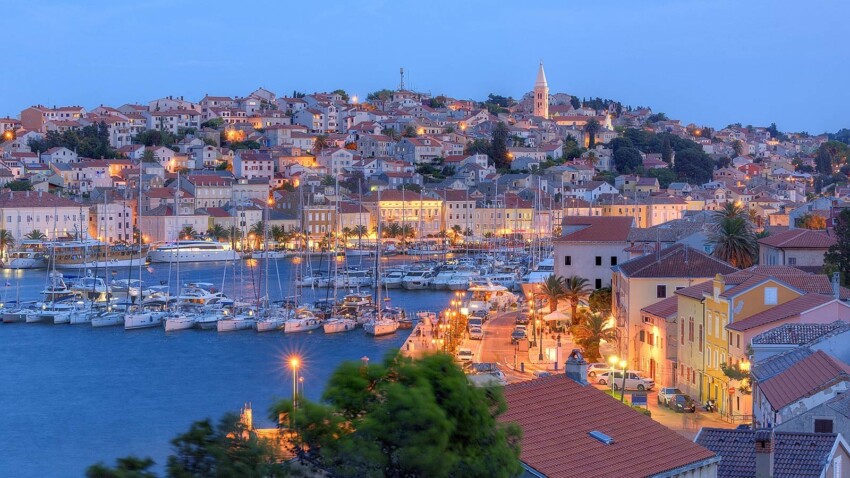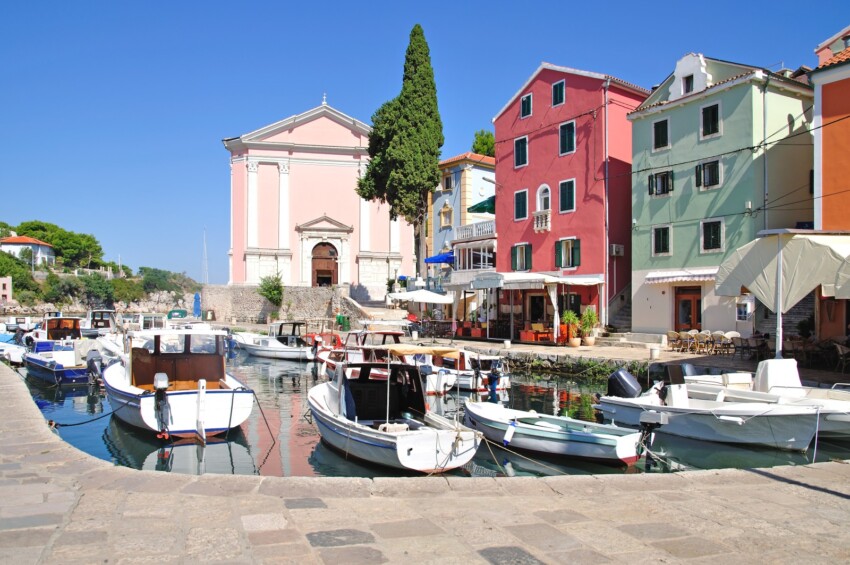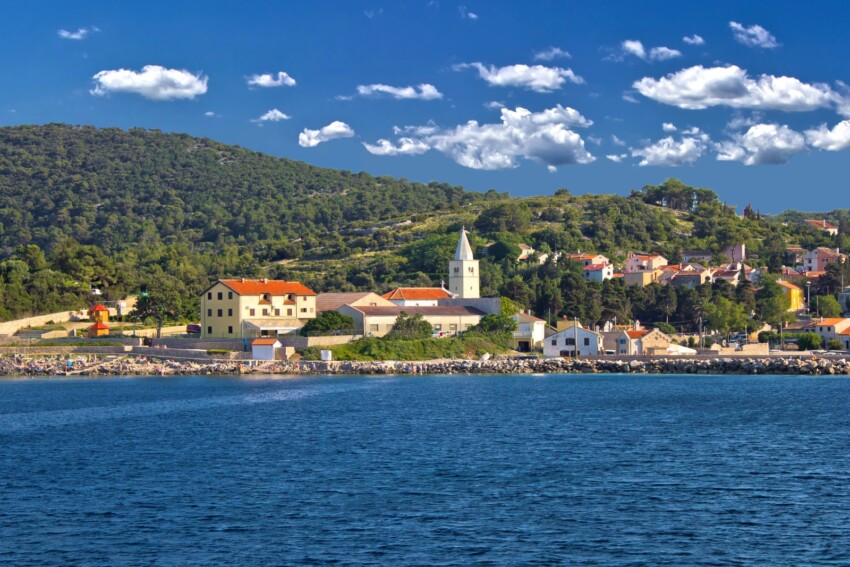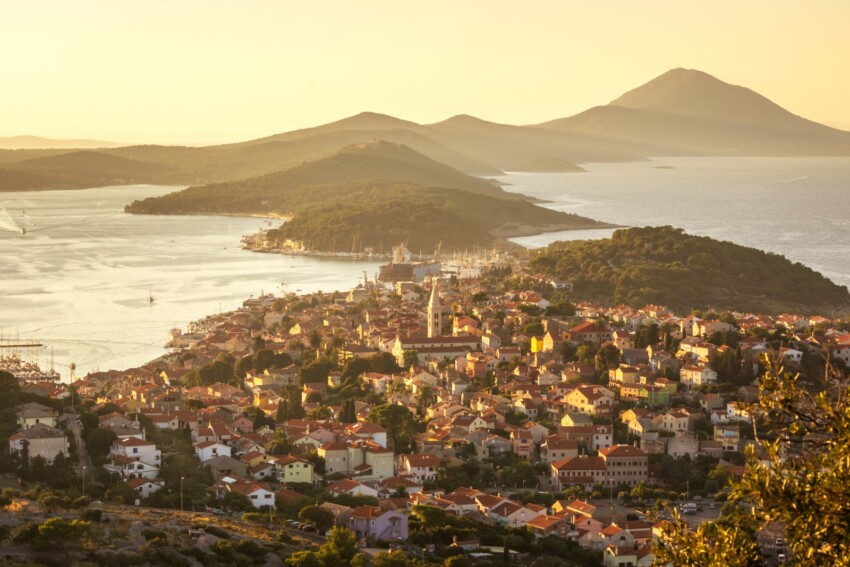

Of the twin islands in the Kvarner Gulf, Losinj and Cres, the former is certainly the most populated and touristy but has retained its charm.
Along its indented coastline are many small bays and coves surrounded by pine forests and washed by an unspoilt sea: its waters are inhabited by dolphins and are home to the first marine protected area for cetaceans in the entire Mediterranean.
The island is also famous for its lush nature rich in exotic plants such as lemons, bananas, eucalyptus and medicinal herbs, which have given rise to aromatherapy activities and events.
True, it cannot be said that Lošinj is a quiet tourist resort, especially in the summer months when it is taken by storm by tourists, but it is certainly an ideal destination for a holiday of relaxation and nature.

Situated on a wide, sheltered bay along the southern coast of the island, Mali Losinj is a true gem that will leave you speechless with wonder.
Very picturesque is the harbour, framed by the green pine forests that grow on the surrounding hills, while the waterfront is lined with imposing houses built by wealthy sea captains in the 19th century, testimony to the glitz and prosperity of yesteryear.
Other luxurious villas, concentrated in the south-western part of the bay, were instead built in the late 19th century by wealthy Viennese and Hungarians who came to Mali Lošinj to enjoy some fresh air.
The town’s most interesting religious building is the Church of the Nativity of the Virgin, which overlooks a paved square that was once the main meeting place for the locals. Built at the turn of the 17th and 18th centuries, it contains valuable works of art inside.
If you love art, visit the local section of the Lošinj Museum, housed in the elegant Fritzy Palace. The museum exhibits a collection of paintings from the 17th and 18th centuries, photographs from the early 20th century and works of modern and contemporary art, including sculptures by some of the most important Croatian artists of the 20th century: Ivan Meštrović, Frano Kršinić and Antun Augustinčić.
For lovers of the sea and animals, we recommend a visit to the Sea Turtle Conservation Centre, dedicated to the rehabilitation of turtles that have become entangled in plastic objects or fishing nets.
The centre is run by the Blue World organisation, which carries out various research, awareness-raising and conservation projects.

Despite its name, Veli Losinj (in Croatian, Veli means “large”) is a smaller town than neighbouring Mali Losinj and is also a little less crowded, but certainly no less charming thanks to its delightful pastel-coloured houses, restaurants, cafés and hotels clustered around a picturesque harbour.
The city’s most impressive sight is that of the defensive tower, which juts out from a tangle of alleyways behind the harbour. It was built by the Venetians in the 15th century to defend the city from Turkish attacks.
Today the tower houses the local section of the Lovinj Museum; visit it to learn about the island’s fascinating maritime history, then climb to the top of the tower for a panoramic view of the town.
Another building that certainly doesn’t go unnoticed is the majestic Church of St Anthony, built in the 18th century on the remains of an earlier church thanks to generous donations from local sea captains. Inside are valuable works of art and seven marble altars from Italy.

Like all Croatian islands, Lošinj abounds with beautiful beaches, coves and inlets that open up along its rugged coastline.
Below we suggest some of the most beautiful beaches on Lošinj:

Numerous boat trips depart from Lošinj with the nearby islands of Susak and Ilovik as their main destination. On the beaches of Lusak, fine sand covers a layer of limestone underneath, creating a truly impressive landscape.
If you have a car, you can easily reach the nearby island of Cres, which is connected by a movable bridge. Scarcely inhabited, Cres is still largely a wild island where you can admire ancient villages perched on hillsides, a rugged coastline with high headlands and hidden coves and lush vegetation.
Lošinj’s rolling hills and trails invite for relaxing bike rides, while the waters around the island are perfect for memorable diving, with some spots even suitable for beginners.
When it comes to choosing where to sleep on Lošinj, you’ll be spoilt for choice. There are plenty of room rentals and private houses on the island, rented by locals during the peak summer season. There are also several hotels and facilities such as residences or campsites.
Choosing where to stay on Lošinj depends a lot on the type of holiday you intend to have, whether it is permanent or itinerant, quiet or hectic: the northern part of Lošinj is almost completely wild and uninhabited: the only place to sleep is Nerezine, which faces the east coast opposite the island of Cres. A little further south is Sveti Jakov, a small place where there are, however, numerous flats for rent. These two localities are chosen by those who love tranquillity and want to experience local life. It is also easier to find cheap accommodation, given their lower tourist appeal.
Otherwise, the northern part of the island is made up of the municipality of Ćunski. It is located in the interior, along road 100 that runs all along Lošinj in a north-south direction, so it is far from the sea. However, it is a good option for those planning to tour the island, as it is in an excellent location for exploring both the northern and southern parts, and it is also very close to the airport, making it the most convenient option for sleeping for those arriving on the island by plane.
The southern part of Lošinj is by far the most developed in terms of tourism, with the two towns of Mali Lošinj and Veli Lošinj. Of the two, Mali Lošinj is larger and more central, so it may prove to be the best option for sleeping, thanks also to the abundance of hotels, accommodation and residences.
Below are some of the best places to stay on the island of Lošinj.
Lošinj can be reached by ferry from Venice or by catamaran from some Italian Adriatic cities, while there are ferries departing from several cities in mainland Croatia, including Rijeka.
The main tourist resorts on the island are connected by local buses.

Almost 1100 species of plants grow on the island of Lošinj, of which more than 900 are autochthonous, while 50 are protected species.
This incredible variety of plants also includes 230 aromatic and medicinal herbs, such as eucalyptus, sage, lavender, oleander, myrtle, bougainvillea, laurel, mandarin… With such an abundance of raw materials available, aromatherapy has become almost an emblem of the island.
The tourist board organises specific events to promote the island’s rich natural heritage, including months dedicated to a specific aromatic herb during which towns are decorated with flowers, restaurants offer themed menus, and liqueurs and other products created with that particular herb are sold.
A must-see tourist attraction for aromatherapy lovers is the Fragrance Garden in Mali Lošinj, a true paradise of natural fragrances with over 250 Mediterranean and 100 exotic plant species framed by gromače, traditional stone walls.
Over time, small businesses have sprung up, often individual or family-run, producing natural cosmetic lines with Lošinj’s herbs.
A perfume, oil, deodorant or other natural aromatherapy product could be a nice souvenir to take home, to continue breathing in the holiday air even when the holidays are a distant memory!
What's the weather at Lošinj? Below are the temperatures and the weather forecast at Lošinj for the next few days.
Theisland of Lošinj, or Lošinj in Croatian, is part of the Kvarner Islands archipelago, located in the Primorsko-Goranska županija (Primorsko-Goranska županija in Croatian) region in the northern part of the country. It is one of Croatia's islands furthest from the coast, yet it is so close to theisland of Cres that the municipality of Osor extends over both.
Lošinj and Cres are practically attached, separated by an artificial channel only a few metres wide. The island lies more or less at the same latitude as the Italian city of Ravenna, from which it is about 160 kilometres away as the crow flies.